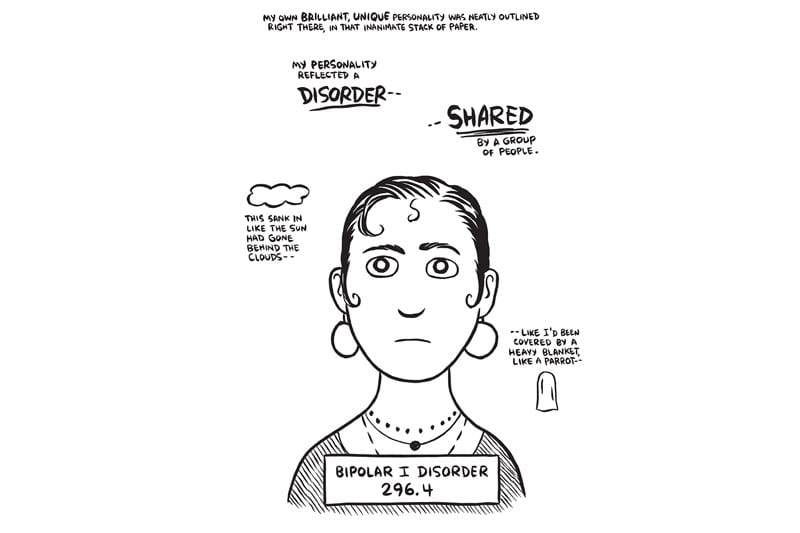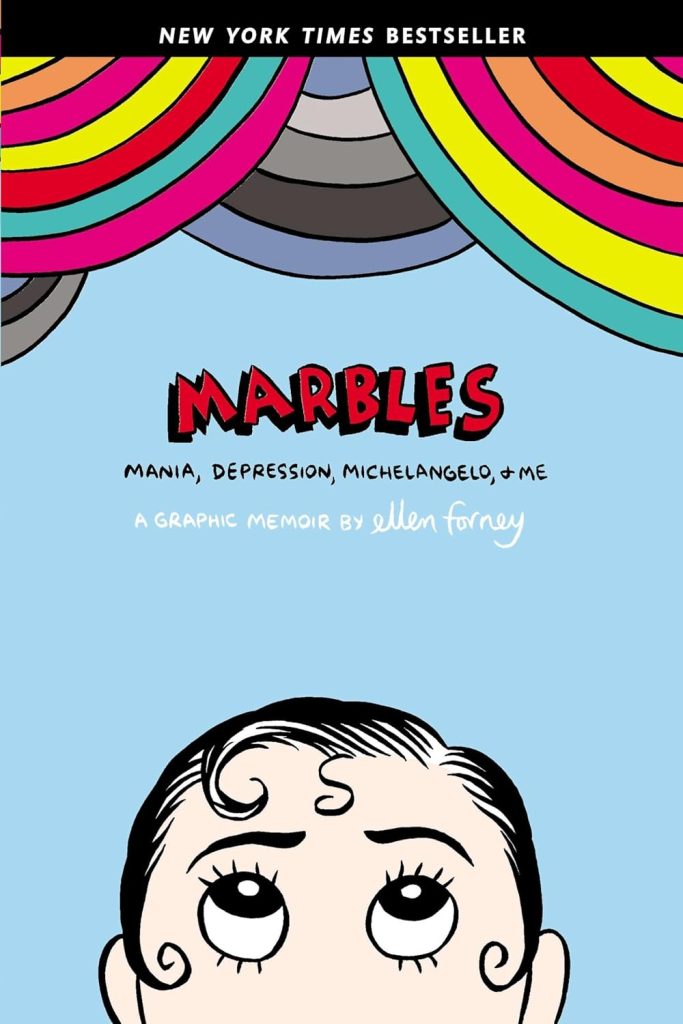Ellen Forney has a wonderful sense of humor about the various afflictions and difficulties that she chronicles in her candid and affectingly raw graphic memoir Marbles: Mania, Depression, Michelangelo and Me. Her ability to see the comic side of so much of the darkness that she encountered in her battle with bipolar disorder, and all of the unpleasantness that it caused, marries perfectly with her choice of medium, her cartoon self at times parodying her own psychology and at other times giving a clear indication to the reader of the depths to which the disease took her.
One of the many results achieved in Forney’s New York Times Bestselling 2012 release is a distinct sense in which a further step has been taken towards the de-stigmatization of bipolar disorder and, by association, all mood-altering psychological disorders. “It’s deeply empowering to see a writer so boldly trek into her own psyche and unpack the tremendous highs and appalling lows associated with the particular disorder, all the while reminded of the fact that the piece of art you are experiencing was created out of their genius. Forney is a shining light for all those who suffer from disorders like the one she depicts”, explains Laura Cho, mental health writer at Writinity.
It’s in this willingness to adopt a state of vulnerability that the real heart of Forney’s work springs off the page. She, and her monochromatic illustrated persona, talk directly to the reader with a candor that is irresistible. Forney knows that she is exposing herself to the voyeuristic glares of outsiders and she plays openly into that, giving readers the full experience of her disorder, allowing them to sit alongside her for her ugliest and most extraordinarily beautiful moments. It’s a privilege and a burden for the reader to be so exposed to the details of her life and that contradictory state keeps the reader to complete attention as they navigate the story with Forney as their guide.
The art work is wonderfully creative but rarely surrealist, which is an important distinction for Forney. When there is something depicted on the page that sits outside of the bounds of normal life it’s not that we are experiencing something surreal, but more that we are seeing the very real creations of her mind laid out in front of us. At times the content is wonderfully realist, which highlights the unavoidable reality of her struggles. A single page shows a very minimalist, distanced portrayal of one of her low days as she travels from her bed slowly out to the couch which she then uses as a second bed. These kinds of simplistic visual descriptions of the practical realities of suffering from bipolar disorder are really affecting and contrast intriguingly with the much more creative artwork that surrounds them.
One of the most fascinating psychological, or perhaps more accurately intellectual, battles that Forney represents relates to identity, a conversation that she implicitly extends from her mind onto the page and into the minds of her readers. “It’s clear that Forney fears her disease is the thing that defines who she is, that the other elements to her character are folded up in the immense swathes of her illness”, notes Charles Cracknell, review blogger at Draft Beyond. She even associates her artistic talent with the disorder, jokingly gifting herself a membership card to the ‘Van Gogh Club’ mentally deranged artists. Separating Ellen Forney from bipolar disorder is one of the challenges of her life and, in a meta-textual sense, one of the reader’s challenges as well. When we look at the graphic memoir as a whole, we realize the extent to which we have received a real education in bipolar disorder, but not much of an education in Ellen Forney. Its less of a memoir of her and more of a memoir of her disorder, using her life as the lens through which we the audience are gazing,
Marbles is a singular achievement. An immensely moving and informative expose of the terrible affliction that bipolar disorder can be. It’s also a testament to Forney’s own journey to come to terms with her condition and a message of hope to anyone who finds themselves in her predicament. Witty, charming and brutally honest, it stays with you for a long time.
Want to read Marbles:Mania, Depression, Michelangelo and Me? Check out the link below!
Your purchases will help support the costs of running rtor.org, a free service of Laurel House, Inc., 501 (C)(3), non-profit organization.Author Bio: Ashley Halsey is a professional author, working at Lucky Assignments and Gum Essays . A mother of two children, she enjoys travelling, reading and researching the topics that inform her writing.
The opinions and views expressed in this guest blog do not necessarily reflect those of www.rtor.org or its sponsor, Laurel House, Inc. The author and www.rtor.org have no affiliations with any products or services mentioned in this article or linked to herein.
Recommended for You
- Veterans and Addiction Recovery: How Families Can Support Their Service Member’s Healing Journey - July 14, 2025
- Trauma-Aware Yoga: A Gentle Path to Healing and Recovery - July 10, 2025
- Why Eating Disorders in Men Are Often Missed - July 3, 2025






